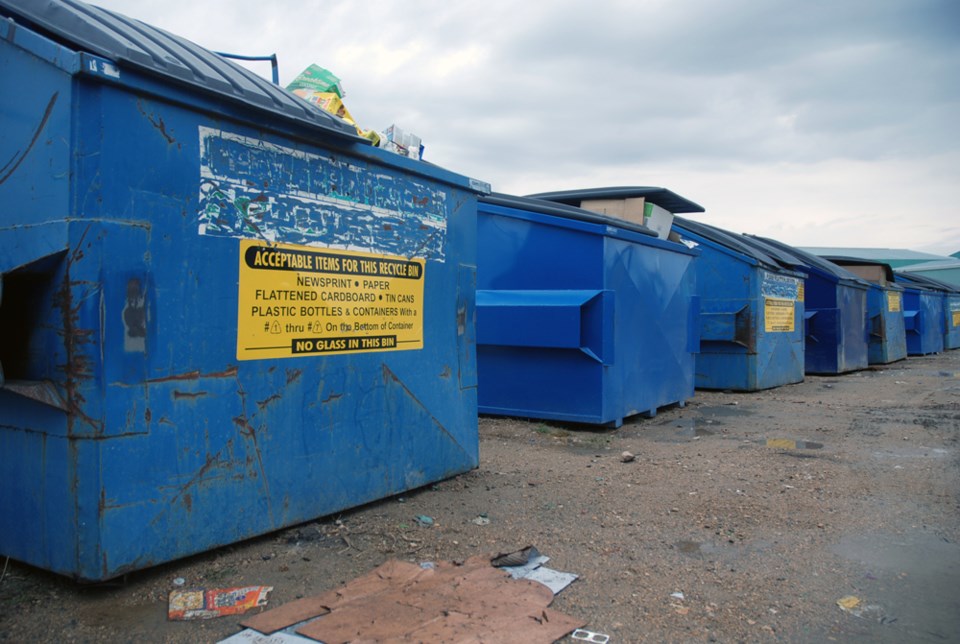It seems that the Multi-Material Recycling Program (MMRP) is once again being put on hold due to the most recent changes to the program.
As a result of consultation, the government has made adjustments that make allowances for small and medium sized businesses. The problem is Multi-Material Stewardship Western (MMSW), who is operating the program, has requested more time to see how these changes will affect their contracts.
“We did finalize the small business policy that MMSW had a draft policy with some changes to the threshold volume and allowed a transition period,” said Wes Kotyk, executive director of Environmental Protection branch for the Ministry of Environment. “So we have communicated theses changes to MMSW and as a result they are in the process of evaluating what these changes mean. They are also needing some time to amend contracts they have with their stewards and their municipalities.”
As the situation stands right now, Kotyk said the program will still move forward, so any businesses that aren’t exempt from under the latest changes will still have to participate and register with MMSW. Unfortunately, that doesn’t mean municipalities will get any of the planned funding, which poses quite a problem.
The program was expected to launch at the beginning of the year, so many – if not all – municipalities and recycling organizations budgeted with the expected additional income in mind. Without that money and with the prices of recycling fluctuating and decreasing, it’s making it difficult to balance the books.
“Right now, we’re receiving very little money for the recycling collection we do, so we were really looking forward to MMRP coming into play because that meant we’d be getting some type of revenue over top of what we’re getting right now for what we ship. This would help offset costs,” said Wendy Yaworski, Humboldt REACT general manager. “(MMRP being postponed) is having a very adverse effect on our budgeting process … what we were getting paid for previously (for recycling) has decreased substantially. We’re only going to get a third of what we were getting previously, so this would have made a world of difference.”
Yaworski said REACT had anticipated an extra $145,000 from the MMRP, which they are now forced to do without. Needless to say, the sudden lack of funding is a big disappointment to Yaworski and it’s likely that other municipalities and cities will also be feeling that pinch. To appease these communities, the government is reallocating $500,000 to help cover the costs of recycling over the next two years. Unfortunately, considering the variance in population sizes between communities, there’s a good chance Humboldt REACT won’t see very much of that money, at least not compared to the funding they were expecting to receive.
According to Yaworski, the MMRP had been talked about and anticipated for the past 10-15 years, but still hasn’t been finalized. Considering that time span and the anticipated launch date, it’s curious as to why the government would still be in consultations that would lead to more changes and causing even further delay.
Either way, Kotyk said the ministry is expecting a response from MMSW within the next couple of weeks, after which they’ll have to sit down with them again to discuss it. Until then, the final date for the launch of MMRP will remain unknown.
“Things like steward registration can still occur, that process is still ongoing,” said Kotyk. “Other than finalizing the contracts, everything else should be moving along.”
Despite his words, the contracts with MMSW are the core of the program and without them MMRP can fall apart. Organizations such as REACT are already struggling with costs. Going into 2015, Yaworski said REACT will only be getting approximately $33,000, which is only about a third of what they had gotten the year before. The anticipated MMRP funding would have helped cover that.
“Recycling brokering is very volatile; revenues from year to year is volatile and right now, there’s no money in recycling. When we ship product to the mills, we’re not getting paid what we were getting years ago,” said Yaworski. “Prices have been slowly dropping. We’ve been expecting prices to rebound, but it’s not bouncing back.”
In a nutshell, the program is designed to make companies and organizations that mass-produce recyclable material responsible for it. By registering with MMRP, they’d have to pay a rate on the quantity of material they produce, which would be redistributed via MMSW to municipalities and recycling organizations for the collection and the materials they send for recycling.
The latest changes to the program bestow an exemption on small businesses and make allowances for medium-sized businesses. So at this point, fingers are crossed that this is the last hurdle before MMRP can finally get the green light.




